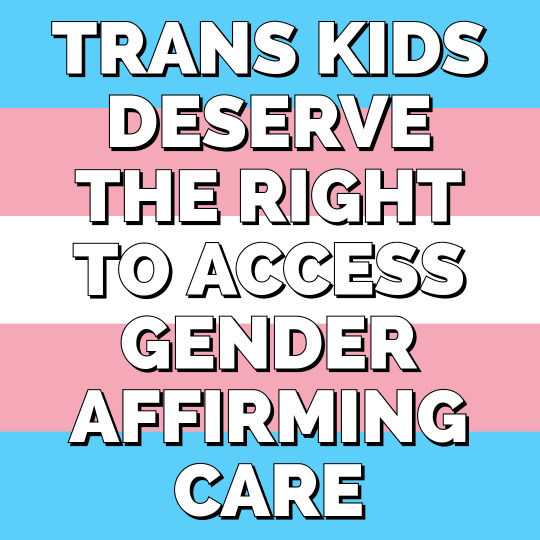#gender affirming care is healthcare
Explore tagged Tumblr posts
Text
"Missouri Attorney General Andrew Bailey terminated his emergency rule on gender-affirming care Tuesday — less than a week after the state legislature sent a ban on minors starting treatment to the governor’s desk.
The ACLU of Missouri filed a lawsuit in late April seeking to block Bailey’s emergency rule, alleging the attorney general didn’t have the authority to use the state’s consumer protection law to block access to puberty blockers, hormone therapy and gender-affirming surgery. A judge put the rules on hold until July, when a hearing is scheduled...
The now-terminated emergency order would’ve affected adults, a step that caused fear in the LGBTQ+ community, advocates told The Independent. Some began preparing to move out of state when they heard about the emergency order...
A spokesperson for the Missouri Secretary of State’s office said he received the termination paperwork around 4 p.m. Tuesday [May 16, 2023].
If Bailey wishes to enact his order, which would set barriers to accessing gender-affirming care, he must restart the process...
The ACLU of Missouri released a statement Tuesday evening, calling the termination a “victory for Missourians’ right to bodily autonomy.”
“After weeks of embarrassing Missouri on the national stage, the Attorney General has finally joined everyone else in recognizing that his hasty attempt to usurp other branches of government cannot withstand scrutiny,” the statement says.
House Minority Leader Crystal Quade, D-Springfield, said in a statement that Bailey “grossly overstepped his legal authority, and everyone knows it.
“So, it isn’t surprising he withdrew his unconstitutional rule knowing another embarrassing court defeat was inevitable,” she said. “Missourians deserve an attorney general worthy of the office, not one who persecutes innocent Missourians for political gain.”
Fischer said, despite uncertain circumstances, the removal of barriers to care is a “win” for transgender Missourians.
“From the conversations we’ve already had with community members and trans leadership, people are thrilled to see the attorney general terminate his rule especially since it targeted the entire trans community: children and adults. In our eyes, this is a win,” he said."
-via Missouri Independent, 5/16/23
Note:
It's nowhere near enough, but it's still so important, especially for all the trans adults in Missouri who were being forcibly detransitioned and starting to be denied access to gender-affirming care, including hormones, which they'd often been on for years.
At this point, I will celebrate every bit of respite we can get.
Missouri would've been the first and only state to ban access to transgender care for adults. It's inexcusable that trans kids are still going to be denied care. But if this rule hadn't been withdrawn, there would've been a lengthy court battle over it lasting years, and in the meantime, every red state that could get away with it would be using Missouri as a blueprint and successful precedent to pass their own bans on gender affirming care for adults.
The fact that Republicans have been denied that successful precedent is VITAL.
#transgender#transphobia#trans rights#gender affirming care#united states#us politics#missouri#attorney general#lgbtq#lgbtq rights#queer community#trans rights are human rights#healthcare access#healthcare#gender affirming care is healthcare#good news#hope
199 notes
·
View notes
Text
Jessica addressing the misinformation around gender affirming care
youtube
Trans rights are human rights
Gender affirming care saves lives
#jessica kellgren fozard#trans rights are human rights#gender affirming care#education#misinformation#pride month#trans rights#transphobia#ignorance#protect trans rights#Youtube#lgbt rights#lgbtqia#gender affirming care is healthcare
2 notes
·
View notes
Text
More details here!!
Trans advocates are celebrating after a Louisiana bill seeking to ban trans youth from accessing gender-affirming care was defeated in the state’s Senate Health and Welfare Committee on Wednesday.
After hours of public testimony from a packed room, the committee voted 5-4 to kill the H.B. 648. Committee Chairman Fred Mills (R) strayed from his fellow Republicans to break the tie and vote against the bill alongside Democrats.
“I guess I’ve always believed in my heart of hearts that a decision should be made by a patient and a physician,” Mills said, according to WWNO...
Dr. [Clinton] Mixon, who provides gender-affirming care to youth, pointed out findings from the Louisiana Department of Health that no gender-affirming surgery was performed on a minor in the state between 2017 and 2021.
“When you prescribe hormone therapies to these kids, they get better,” Dr. Mixon said. “They stop cutting. They want to live. They go to school. They get better grades. Their relationships improve, and they can begin to live a more normal teenage life.” ...
Mills has now become an enemy of Republican extremists for voting alongside Democrats...
But Mills isn’t phased. When asked about it by the Louisiana Illuminator, Mills didn’t see a reason to worry about it.
“Why should I? They don’t live in District 22. They don’t have a 337 area code. I didn’t run for office to serve those people”
Trans activist Erin Reed hailed the vote as a “massive, massive win for transgender people.”
“Louisiana becomes only the 3rd red state to beat back a total gender-affirming care ban for trans teens,” Reed added. “Activists there should be truly proud. This was not an easy task.”
-via LGBTQ Nation, 5/25/23
Surprising hope coming from Louisiana! The state senate voted to table a bill that would ban trans youth healthcare!
#trans#trans rights#transgender#lgbt#lgbt rights#lgbtq#transphobia#gender affirming care is healthcare#gender affirming surgery#hrt#trans hrt#hrt estrogen#hrt testosterone#louisiana#united states#us politics#fred mills#good news#hope
14K notes
·
View notes
Text
Someone anonymously messaged me to tell me that writing about detrans folks makes me a traitor to trans people, because all detrans people want to push conversion therapy on us and forcibly detransition us.
That’s precisely the kind of narrative that ends up pushing detransitioners into the arms of TERFs and the religious far-right.
There’s nothing inherently wrong with detransitioning. Sometimes people realize that transitioning no longer suits them, or never really did. And that’s fine.
When we systematically push them away regardless of their politics, we make people feel like the only places they can get support are among transphobes. That’s not a good thing. Building de/trans solidarity is an critical tool for disarming anti-trans movements.
#lgbtq#transgender#queer#lgbtqia#trans#lesbian#lgbt#gay#detrans#detransitioners#trans rights#trans rights are human rights#trans health#trans healthcare#gender#gender affirming care#gender affirming healthcare
22K notes
·
View notes
Text
Today is the day! WISH ME LUCKKK!!!💕🥳

It's just the consultation, but it's the first step in this long journey, so I'm ready 💕
#trans#lgbtq#comics#meme#transgender#transgirl#trans memes#mtf hrt#transphobes#hrt#trans comics#trans pride#gender affirming care#gender affirming healthcare#gender transition#gender
7K notes
·
View notes
Text
To all of the people that think that trans healthcare isn't actually healthcare, I would like to remind that I used to starve myself so my hips and boobs were smaller, and I would scream into my pillow for hours to make my voice sound more masculine. I have not done that since receiving gender affirming care, and I am much healthier. That's healthcare to me, and if you don't think that medical care that makes people healthier is health care, I don't know what to tell you
#trans#gender affirming healthcare#gender affirming care is healthcare#trans rights#lgbtq#tw mentions of starving yourself#tw mentions of self harm#also i am not the exception#i know so many trans folks that hurt themselves to pass better
1 note
·
View note
Text

Tories on their way out, giving the UK even more reason to send them packing in July.
Erin Reed at Erin In The Morning:
On May 31, NHS England sent a letter to every patient on the waiting list for puberty blockers, stating that possession of such blockers will be considered a crime. The letter follows an edict issued by Conservative Secretary of State for Health and Social Care Victoria Mary Atkins and also mandates that transgender youth who obtained their puberty blockers through private doctors must discontinue their medication. This letter and edict mean that the United Kingdom now has some of the harshest policies targeting transgender youth of any liberal democracy in the world. On May 29th, Atkins announced on twitter, “Today I have taken bold action to protect children following the Cass Review, using emergency powers to ban puberty blockers for new treatments of gender dysphoria from private clinics and for all purposes from overseas prescribers into Great Britain.” Following the announcement, she linked to an edict declaring an “emergency prohibition” on puberty blockers in England, Wales, and Scotland.
The prohibition relies on a decades-old law that allows for the emergency prohibition of medications without the need for a full legislative process; no vote was taken on the edict, and the order was issued just before parliament dissolved for the general election, meaning it could not be overturned. According to UK-based advocate Trans Safety Now, the last and only time such powers were used was in response to deaths among users of an herb found in some Chinese medicine in 1999. Jo Maugham, who leads the Good Law Project, stated about the use of these powers, “It is breathtaking that thousands or tens of thousands of loving families are going to be criminalized by a law made by a Minister, never approved by Parliament, subject to no consultation and the media is not reporting it." On Friday, following the announcement, Lee Hurley of Trans Writes released a copy of a letter sent to families on the NHS waiting list for puberty blockers. The letter indicates that those receiving puberty blockers from the NHS can continue taking them. However, given the enormous wait lists, a substantial number of families opted to get their puberty blockers through private practitioners registered in the European Economic Area or Switzerland—a fully legal practice in the United Kingdom. For those receiving their care through those systems, the letter states, “You will need to stop taking GnRH analogues unless you are newly prescribed them by a UK-registered doctor, nurse, or pharmacist. These medications can be safely stopped and you do not need to be weaned off.”
Critically, the edict does not only target providers; it also targets patients and their families. The letter states, “It will also be a criminal offence to possess these medicines, where the individual had reasonable cause to know that the medicine had been sold or supplied in breach of the ban.” When asked about this provision, Jo Maugham stated, “It basically says puberty blockers are being treated like other illegal drugs like cocaine and heroin.” He then followed up with the applicable law, which indicates that those who violate the ban could be imprisoned for two years. The decision comes following the publication of the Cass Review, a highly politicized document developed with a secretive list of advisors, some of whom were later found to be meeting regularly with political operatives of Republican Governor Ron DeSantis in Florida.
The UK's hateful anti-trans crusade against gender-affirming care for trans youths continue, as Secretary of State for Health and Social Care Victoria Mary Atkins (Con) issues a reckless edict ordering trans youth who obtained their puberty blockers through private doctors that they must stop using them.
369 notes
·
View notes
Text
NEW YORK (AP) — New York Attorney General Letitia James on Monday told hospitals that they would be violating state law if they stop offering gender-affirming care for people under age 19 in response to an executive order from President Donald Trump aimed at curtailing federal funding for such treatments.
In a letter, James, a Democrat, told health care facilities that refusing to provide the treatments would violate New York’s anti-discrimination laws.
“Regardless of the availability of federal funding, we write to further remind you of your obligations to comply with New York State laws,” her letter reads.
Everyone say thank you to NY Attorney General Letitia James!!!
#I see you!!! she’s been such a gift#nyc#trans rights#lgbtq#trans healthcare#gender affirming care#us news#us politics#news
2K notes
·
View notes
Text
Hi folks!
I (they/them) am now recruiting trans and gender-diverse folks to answer a survey that should take 10-20 minutes, with a max of 30 minutes.
Participants must be 18 or older, reside in the US and plan to live here at least another year, able to read and write in English, and are willing to answer survey questions about politics, mental health, social support, and your access to gender affirming care over the next 4 years.
There is a raffle for compensation.
For questions, message me here or email me at [email protected]

#transgender#trans pride#transgirl#trans man#trans#transfem#transmasc#trans men#transmasculine#transfeminine#enby#nonbinary#genderqueer#genderfluid#gender binary#genderbend#gender diversity#gender diverse#demi boy#demi man#demi girl#demiboy#gender affirming care#gender affirming healthcare#gender affirming surgery#gender affirming haircut#chest binding#tucking#binding#packing
564 notes
·
View notes
Text
Because tools like ResistBot and similar have filled up the inboxes and fax machines of Congresspeople, those messages are counted for FAR less than actual live phone calls.
If you absolutely can't handle talking to a human, consider calling at 2am (like I just did). Leave a voicemail!
Be aware that a) they will likely ask for your full name, address, zip code, and or phone number (this is to verify that you actually are a constituent) and b) *the recording time is not that long*.
Write a script if it helps! Stay focused and to the point! Be sure to specifically and explicitly say something *actionable*, like:
"I want the Senator/Representative to support gender-affirming healthcare, particularly regarding these GOP-added ammendments that would ban it, ban funding for it, and even strip funding from any facility that also provides gender-affirming care, just like the Hyde Amendment did for abortion."
Now is an excellent time to tell your Democratic Congress Critters trans Healthcare is important
If you can't safely contact them in person, here are some other options:
Call the Capitol Switchboard at (202) 224-3121 and ask to be connected to the representative of your choice.
Here is one that will send your reps a fax: https://resist.bot/
#queer#queer affirming#gender affirming care#trans rights#gender affirming healthcare#gender affirming care is healthcare#call your senators#call your representatives#leave a voicemail#do not wait
31K notes
·
View notes
Text
goes to a bottom surgery consultation and asks for this guy as my new peanis

#silas speaks#and what if i did#trans masc#transmasc#trans#transgender#bottom surgery#gender affirming care#gender affirming healthcare#queer#lgbtqia#lgbtq#lgbtq+#lgbt+#trans community#queer community#tboy swag#trans things
767 notes
·
View notes
Text
LGBTQ+ organizations and allies are celebrating Michigan for becoming the first state in three years to pass comprehensive anti-discrimination protections for sexual orientation and gender identity. The legislation, which now heads to Gov. Gretchen Whitmer (D) to be signed into law, finally passed after decades of court battles and hold-ups from Republican legislators.
The bill passed in a 64-45 vote in the Democrat-led House on Wednesday. It amends the state’s 1976 Elliott-Larsen Civil Rights Act (ELCRA) to include LGBTQ+ people among its protected groups. The law forbids discrimination in housing, employment, and public accommodation within businesses, government buildings, and educational facilities on the basis of religion, race, color, national origin, age, sex, height, weight, familial status, marital status — and now, LGBTQ+ identity.
Democrats had tried introducing various LGBTQ+ non-discrimination measures over the last 40 years, according to the bill’s gay sponsor Sen. Jeremy Moss (D). However, the attempts were repeatedly voted down by Republican-led legislatures. Last January, Democrats took control of the full legislature for the first time in nearly 40 years, finally giving them the chance to pass the protections.
In July 2022, Michigan’s Supreme Court issued a landmark 5–2 ruling that ELCRA already forbade discrimination based on sexual orientation and gender identity as forms of discrimination based on sex and gender. This followed a 2020 Michigan Court of Claims ruling that said ELCRA didn’t ban anti-gay discrimination as well as a 2018 vote by Michigan’s Civil Rights Commission interpreting ELCRA as protecting LGBTQ+ people from religious-based discrimination...
When the House voted to pass the historic bill on Wednesday, a crowd in the House gallery broke into applause, Bridge Michigan reported. Republican House members had tried adding amendments that would’ve carved out exceptions for religious people to continue discriminating against LGBTQ+ people. None of these amendments passed into the final bill.
Gov. [Whitmer] has signaled that she will soon sign the bill into law. In a Wednesday tweet, she noted the observation of International Women’s Day and wrote, “I’m celebrating trans women who have continuously led the way, despite constant threats to their lives and liberty. I’m proud that we’re finally in a position to expand the Elliott-Larsen Civil Rights Act to protect LGBTQ+ Michiganders. Let’s get it done!”
-via LGBTQ Nation, 3/9/23
Note: If it's not clear from the language, this is basically a done deal--the bill signing IS ABSOLUTELY GOING TO HAPPEN.
As scary as things are right now, there are so many of us fighting to protect ourselves, our communities, and the queer and trans people around us.
This comes only a day after Minnesota's governor signed a landmark executive order that guarantees the right to gender-affirming care and prevents the state from complying with any other states' attempts to interfere. via them.us, 3/9/23
There is hope, and there are so many people fighting for us.
#transgender#trans#trans rights#trans healthcare#top surgery#gender affirming care#trans rights are human rights#michigan#united states#us politics#gretchen whitmer#democrats#voting matters#lgbtq#lgbtq rights#transphobia cw#good news#hope
8K notes
·
View notes
Text
The fact that leagues of smart and rational trans adults who are informed about the evidence base for puberty blockers wish they could’ve taken them in their youth seems to me pretty darn conclusive evidence that the balance of risk and benefit is favourable.
#lgbtq#transgender#queer#lgbtqia#trans#lgbt#gender affirming care#gender affirming healthcare#medical transition#puberty blockers#trans health#trans healthcare
11K notes
·
View notes
Text
So if you REALLY 'care about children', you support gender affirming care.
But, if you're so small-minded and afraid of human traits that are a bit unusual, then continue supporting hateful policies that motivate children to commit suicide. But their lives should forever be on your conscience.
Gender-affirming care bans are damaging and wrong, according to the largest psychological organisation in the world. Following a resolution taken on Wednesday (28 February), the American Psychological Association (APA) announced that it is fully supportive of gender-affirming care and equally opposed to bans on the medical practice. Passed by an overwhelming vote of 153-9, the policy states that gender-affirming healthcare, including for trans youth, is consistent with the organisation’s mission to promote beneficial, evidence-based care. The policy also addresses the spread of misinformation around gender-affirming care for trans people, which, it says, leads to “unfounded narratives that mischaracterise gender dysphoria and affirming care, likely [to result] in further stigmatisation.”
Continue Reading
239 notes
·
View notes
Text






(ID: six trans flags with text. Text reads "Trans kids exist and deserve to be supported and heard", "Trans kids know themselves and their identities", "Trans kids deserve to become happy trans adults", "Trans kids deserve the right to access gender affirming care", "Trans kids have the right to decide their own names and pronouns", and "Every transgender adult was once a child who should have had support").
3K notes
·
View notes
Text
Remember how we spent all last year and the early part of this one fighting this sort of thing where they slip anti-trans stuff into must pass funding bills?
Here we are again. Please, call your critters in both house and senate. Democrats actually had our backs through these fights in the last few years, but it's not guaranteed given the scapegoating in the press, so call Democratic critters to help stiffen their spines.
If you can't safely contact them in person, here are some other options:
Call the Capitol Switchboard at (202) 224-3121 and ask to be connected to the representative of your choice. Here is one that will send your reps a fax: https://resist.bot/ To get your Critters' numbers to call direct: https://www.congress.gov/members/find-your-member
#House Republicans#Healthcare ban#gender-affirming care#Trans youth#military budget#Trans#Transphobia#Action Item
560 notes
·
View notes